Gibbs Reflective Model Analysis for UK Travel and Tourism Research
VerifiedAdded on 2023/06/10
|6
|1192
|144
Report
AI Summary
This report presents a research analysis of the UK travel and tourism industry, employing the Gibbs reflective model to explore the learning experience and research process. The report includes an introduction to research design, followed by a detailed application of the Gibbs model, encompassing description, feelings, evaluation, analysis, conclusion, and action plan stages. It highlights the use of data visualization, problem-solving skills, and teamwork within the research framework. The report emphasizes the importance of reflective practice in identifying strengths and weaknesses, improving time management, and enhancing confidence in research. The conclusion summarizes key findings, and the report concludes with a list of references, including books, journals, and online resources.
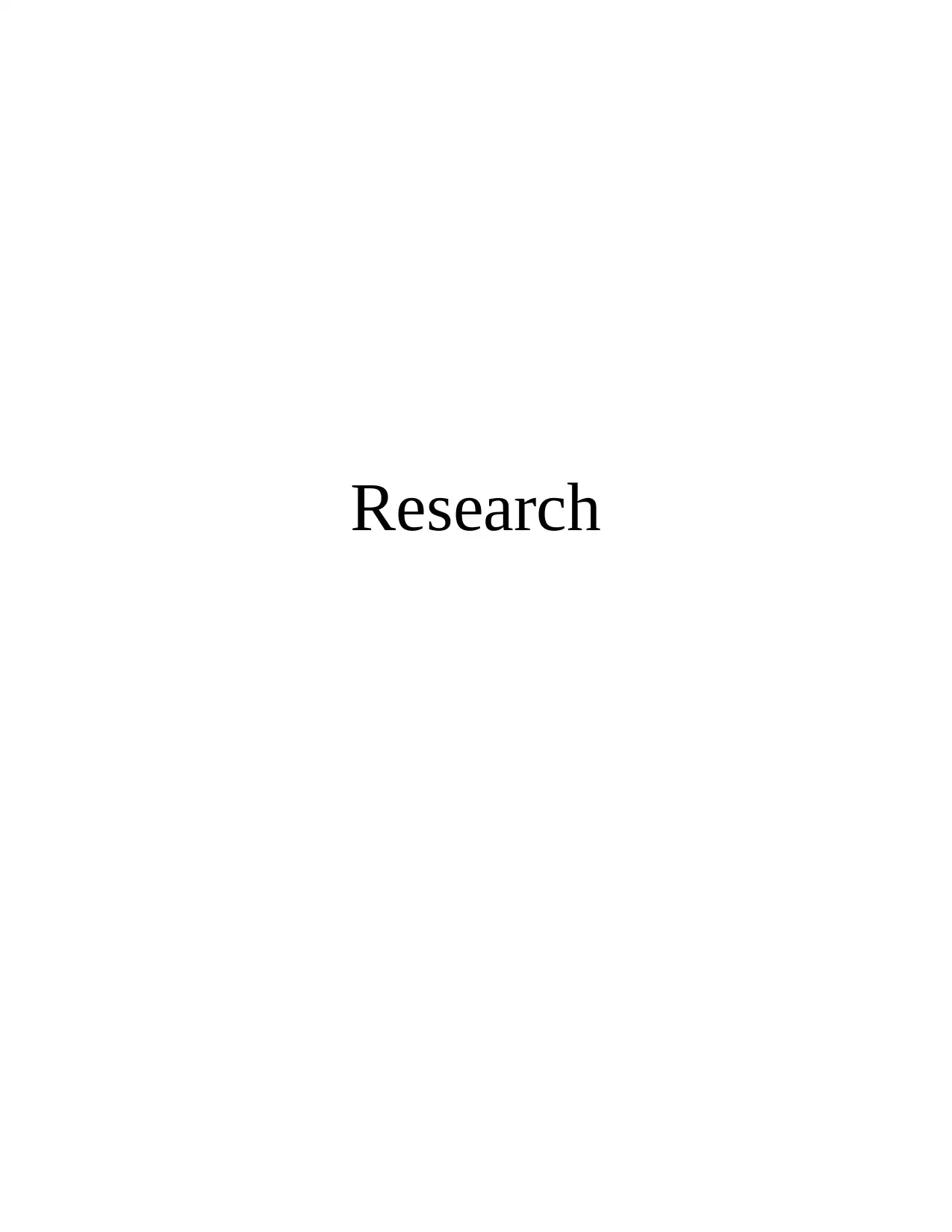
Research
Paraphrase This Document
Need a fresh take? Get an instant paraphrase of this document with our AI Paraphraser
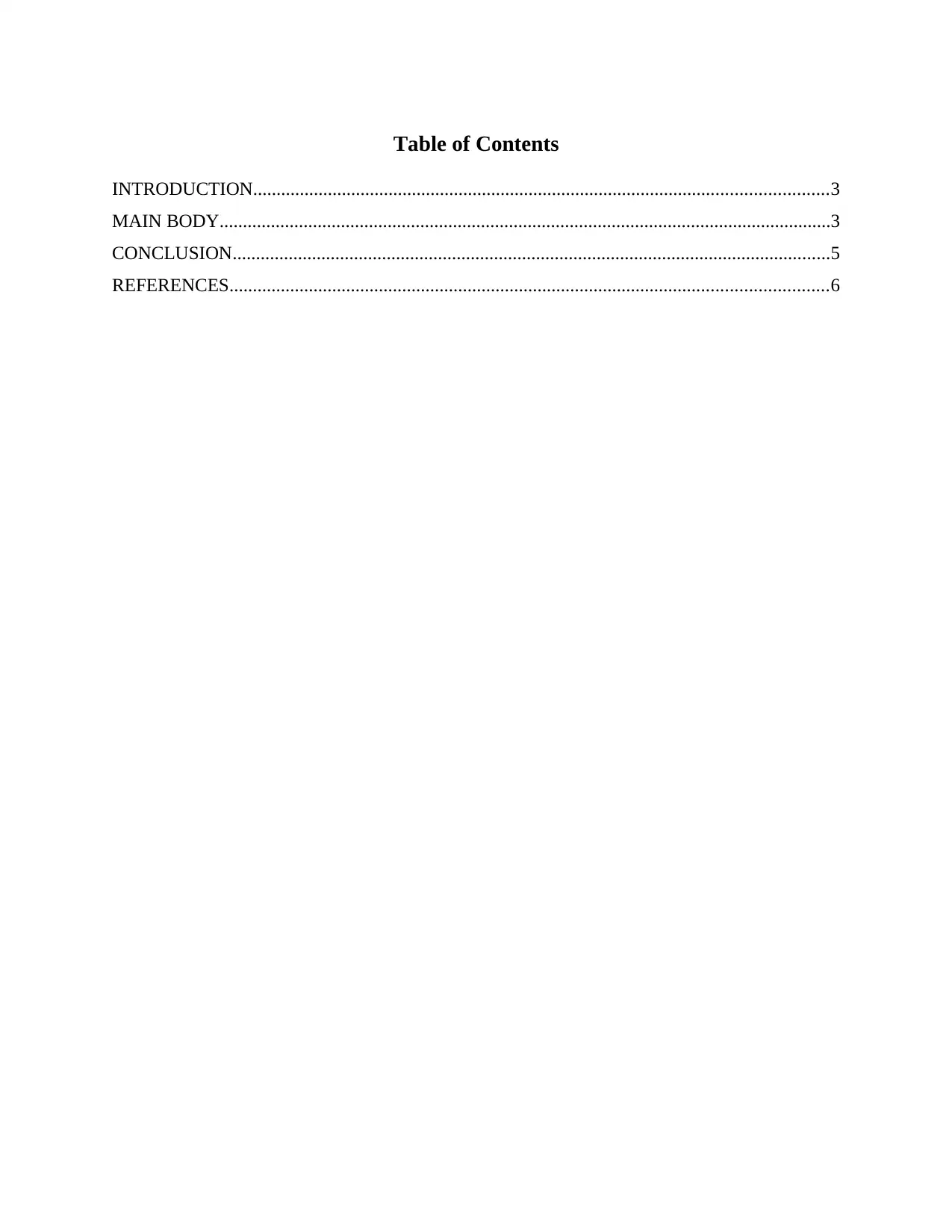
Table of Contents
INTRODUCTION...........................................................................................................................3
MAIN BODY...................................................................................................................................3
CONCLUSION................................................................................................................................5
REFERENCES................................................................................................................................6
INTRODUCTION...........................................................................................................................3
MAIN BODY...................................................................................................................................3
CONCLUSION................................................................................................................................5
REFERENCES................................................................................................................................6
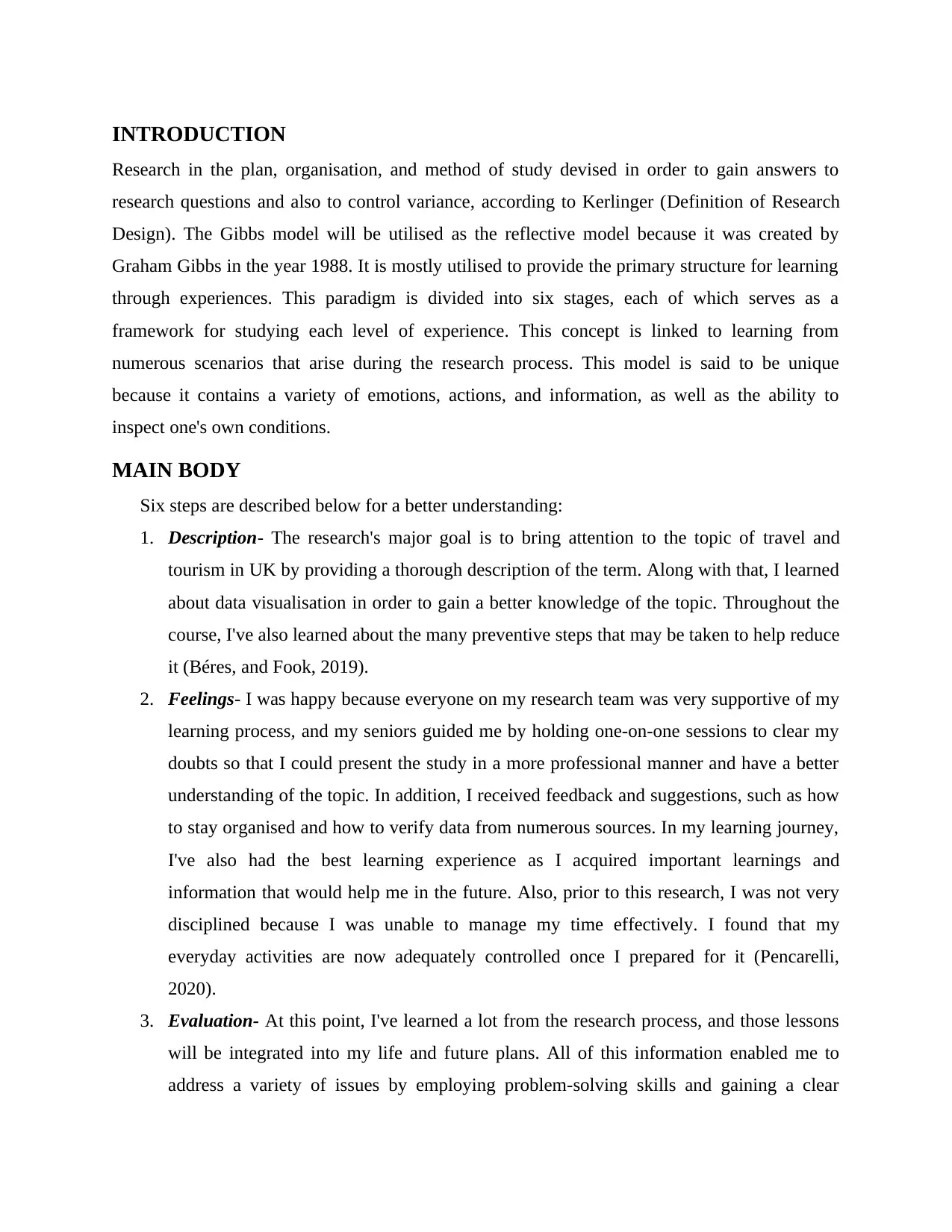
INTRODUCTION
Research in the plan, organisation, and method of study devised in order to gain answers to
research questions and also to control variance, according to Kerlinger (Definition of Research
Design). The Gibbs model will be utilised as the reflective model because it was created by
Graham Gibbs in the year 1988. It is mostly utilised to provide the primary structure for learning
through experiences. This paradigm is divided into six stages, each of which serves as a
framework for studying each level of experience. This concept is linked to learning from
numerous scenarios that arise during the research process. This model is said to be unique
because it contains a variety of emotions, actions, and information, as well as the ability to
inspect one's own conditions.
MAIN BODY
Six steps are described below for a better understanding:
1. Description- The research's major goal is to bring attention to the topic of travel and
tourism in UK by providing a thorough description of the term. Along with that, I learned
about data visualisation in order to gain a better knowledge of the topic. Throughout the
course, I've also learned about the many preventive steps that may be taken to help reduce
it (Béres, and Fook, 2019).
2. Feelings- I was happy because everyone on my research team was very supportive of my
learning process, and my seniors guided me by holding one-on-one sessions to clear my
doubts so that I could present the study in a more professional manner and have a better
understanding of the topic. In addition, I received feedback and suggestions, such as how
to stay organised and how to verify data from numerous sources. In my learning journey,
I've also had the best learning experience as I acquired important learnings and
information that would help me in the future. Also, prior to this research, I was not very
disciplined because I was unable to manage my time effectively. I found that my
everyday activities are now adequately controlled once I prepared for it (Pencarelli,
2020).
3. Evaluation- At this point, I've learned a lot from the research process, and those lessons
will be integrated into my life and future plans. All of this information enabled me to
address a variety of issues by employing problem-solving skills and gaining a clear
Research in the plan, organisation, and method of study devised in order to gain answers to
research questions and also to control variance, according to Kerlinger (Definition of Research
Design). The Gibbs model will be utilised as the reflective model because it was created by
Graham Gibbs in the year 1988. It is mostly utilised to provide the primary structure for learning
through experiences. This paradigm is divided into six stages, each of which serves as a
framework for studying each level of experience. This concept is linked to learning from
numerous scenarios that arise during the research process. This model is said to be unique
because it contains a variety of emotions, actions, and information, as well as the ability to
inspect one's own conditions.
MAIN BODY
Six steps are described below for a better understanding:
1. Description- The research's major goal is to bring attention to the topic of travel and
tourism in UK by providing a thorough description of the term. Along with that, I learned
about data visualisation in order to gain a better knowledge of the topic. Throughout the
course, I've also learned about the many preventive steps that may be taken to help reduce
it (Béres, and Fook, 2019).
2. Feelings- I was happy because everyone on my research team was very supportive of my
learning process, and my seniors guided me by holding one-on-one sessions to clear my
doubts so that I could present the study in a more professional manner and have a better
understanding of the topic. In addition, I received feedback and suggestions, such as how
to stay organised and how to verify data from numerous sources. In my learning journey,
I've also had the best learning experience as I acquired important learnings and
information that would help me in the future. Also, prior to this research, I was not very
disciplined because I was unable to manage my time effectively. I found that my
everyday activities are now adequately controlled once I prepared for it (Pencarelli,
2020).
3. Evaluation- At this point, I've learned a lot from the research process, and those lessons
will be integrated into my life and future plans. All of this information enabled me to
address a variety of issues by employing problem-solving skills and gaining a clear
⊘ This is a preview!⊘
Do you want full access?
Subscribe today to unlock all pages.

Trusted by 1+ million students worldwide
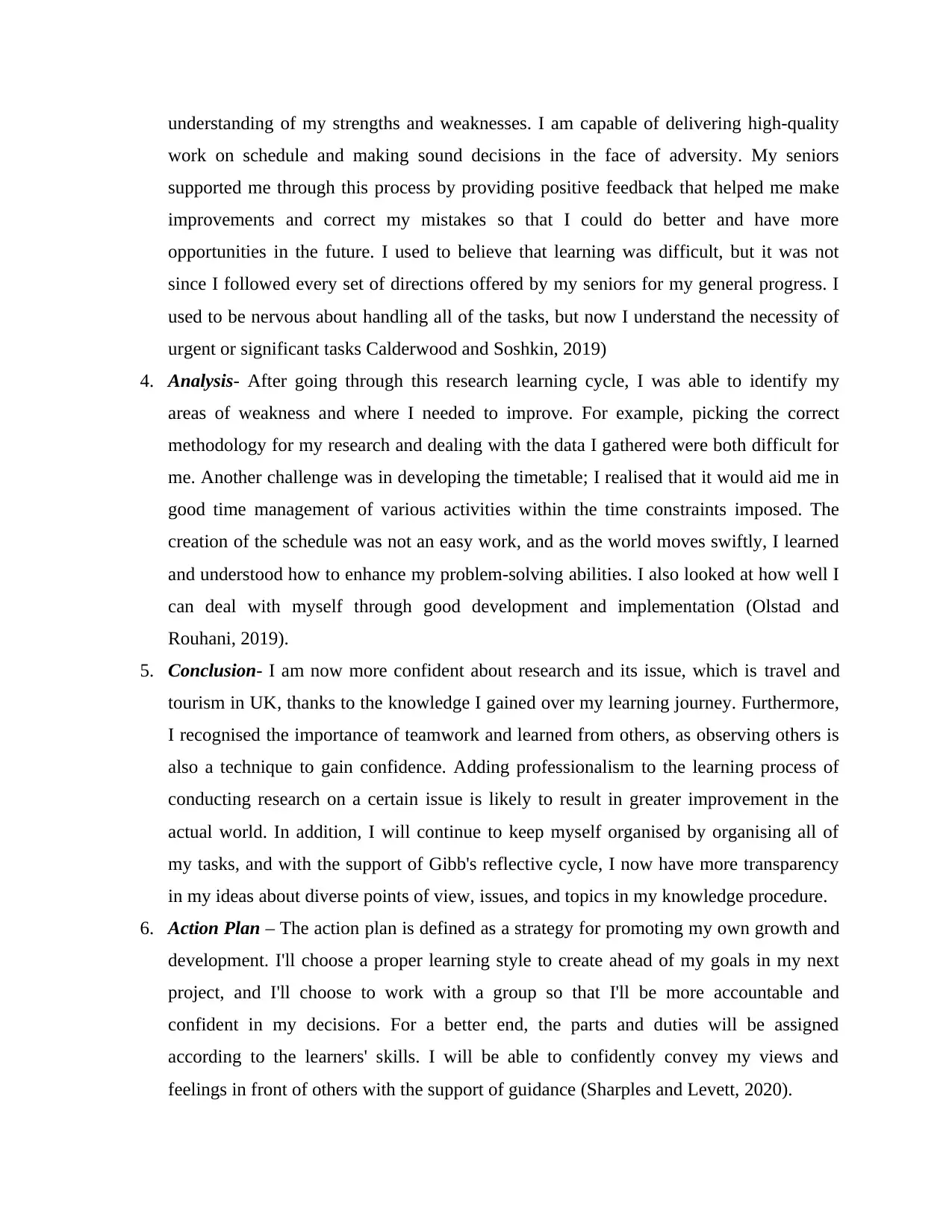
understanding of my strengths and weaknesses. I am capable of delivering high-quality
work on schedule and making sound decisions in the face of adversity. My seniors
supported me through this process by providing positive feedback that helped me make
improvements and correct my mistakes so that I could do better and have more
opportunities in the future. I used to believe that learning was difficult, but it was not
since I followed every set of directions offered by my seniors for my general progress. I
used to be nervous about handling all of the tasks, but now I understand the necessity of
urgent or significant tasks Calderwood and Soshkin, 2019)
4. Analysis- After going through this research learning cycle, I was able to identify my
areas of weakness and where I needed to improve. For example, picking the correct
methodology for my research and dealing with the data I gathered were both difficult for
me. Another challenge was in developing the timetable; I realised that it would aid me in
good time management of various activities within the time constraints imposed. The
creation of the schedule was not an easy work, and as the world moves swiftly, I learned
and understood how to enhance my problem-solving abilities. I also looked at how well I
can deal with myself through good development and implementation (Olstad and
Rouhani, 2019).
5. Conclusion- I am now more confident about research and its issue, which is travel and
tourism in UK, thanks to the knowledge I gained over my learning journey. Furthermore,
I recognised the importance of teamwork and learned from others, as observing others is
also a technique to gain confidence. Adding professionalism to the learning process of
conducting research on a certain issue is likely to result in greater improvement in the
actual world. In addition, I will continue to keep myself organised by organising all of
my tasks, and with the support of Gibb's reflective cycle, I now have more transparency
in my ideas about diverse points of view, issues, and topics in my knowledge procedure.
6. Action Plan – The action plan is defined as a strategy for promoting my own growth and
development. I'll choose a proper learning style to create ahead of my goals in my next
project, and I'll choose to work with a group so that I'll be more accountable and
confident in my decisions. For a better end, the parts and duties will be assigned
according to the learners' skills. I will be able to confidently convey my views and
feelings in front of others with the support of guidance (Sharples and Levett, 2020).
work on schedule and making sound decisions in the face of adversity. My seniors
supported me through this process by providing positive feedback that helped me make
improvements and correct my mistakes so that I could do better and have more
opportunities in the future. I used to believe that learning was difficult, but it was not
since I followed every set of directions offered by my seniors for my general progress. I
used to be nervous about handling all of the tasks, but now I understand the necessity of
urgent or significant tasks Calderwood and Soshkin, 2019)
4. Analysis- After going through this research learning cycle, I was able to identify my
areas of weakness and where I needed to improve. For example, picking the correct
methodology for my research and dealing with the data I gathered were both difficult for
me. Another challenge was in developing the timetable; I realised that it would aid me in
good time management of various activities within the time constraints imposed. The
creation of the schedule was not an easy work, and as the world moves swiftly, I learned
and understood how to enhance my problem-solving abilities. I also looked at how well I
can deal with myself through good development and implementation (Olstad and
Rouhani, 2019).
5. Conclusion- I am now more confident about research and its issue, which is travel and
tourism in UK, thanks to the knowledge I gained over my learning journey. Furthermore,
I recognised the importance of teamwork and learned from others, as observing others is
also a technique to gain confidence. Adding professionalism to the learning process of
conducting research on a certain issue is likely to result in greater improvement in the
actual world. In addition, I will continue to keep myself organised by organising all of
my tasks, and with the support of Gibb's reflective cycle, I now have more transparency
in my ideas about diverse points of view, issues, and topics in my knowledge procedure.
6. Action Plan – The action plan is defined as a strategy for promoting my own growth and
development. I'll choose a proper learning style to create ahead of my goals in my next
project, and I'll choose to work with a group so that I'll be more accountable and
confident in my decisions. For a better end, the parts and duties will be assigned
according to the learners' skills. I will be able to confidently convey my views and
feelings in front of others with the support of guidance (Sharples and Levett, 2020).
Paraphrase This Document
Need a fresh take? Get an instant paraphrase of this document with our AI Paraphraser
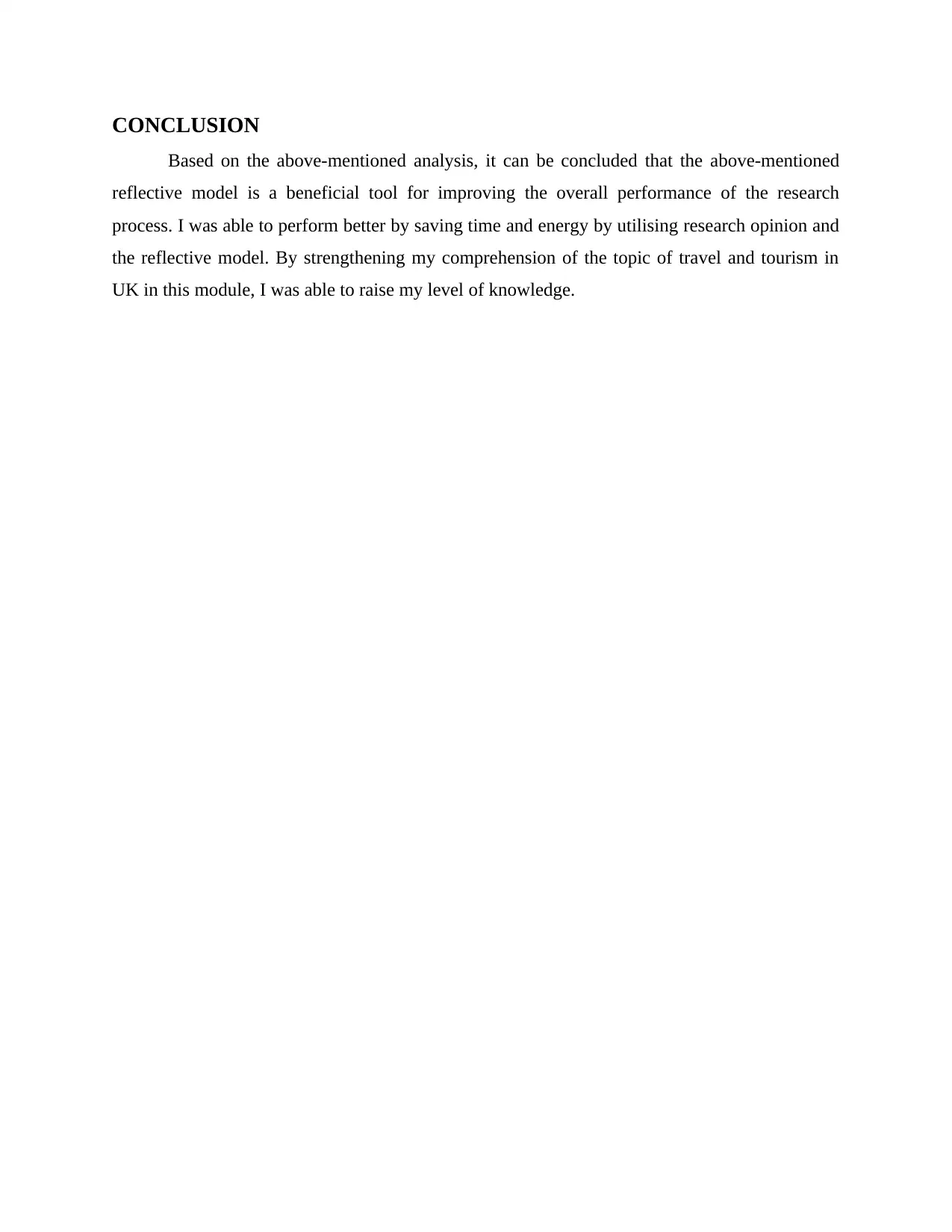
CONCLUSION
Based on the above-mentioned analysis, it can be concluded that the above-mentioned
reflective model is a beneficial tool for improving the overall performance of the research
process. I was able to perform better by saving time and energy by utilising research opinion and
the reflective model. By strengthening my comprehension of the topic of travel and tourism in
UK in this module, I was able to raise my level of knowledge.
Based on the above-mentioned analysis, it can be concluded that the above-mentioned
reflective model is a beneficial tool for improving the overall performance of the research
process. I was able to perform better by saving time and energy by utilising research opinion and
the reflective model. By strengthening my comprehension of the topic of travel and tourism in
UK in this module, I was able to raise my level of knowledge.
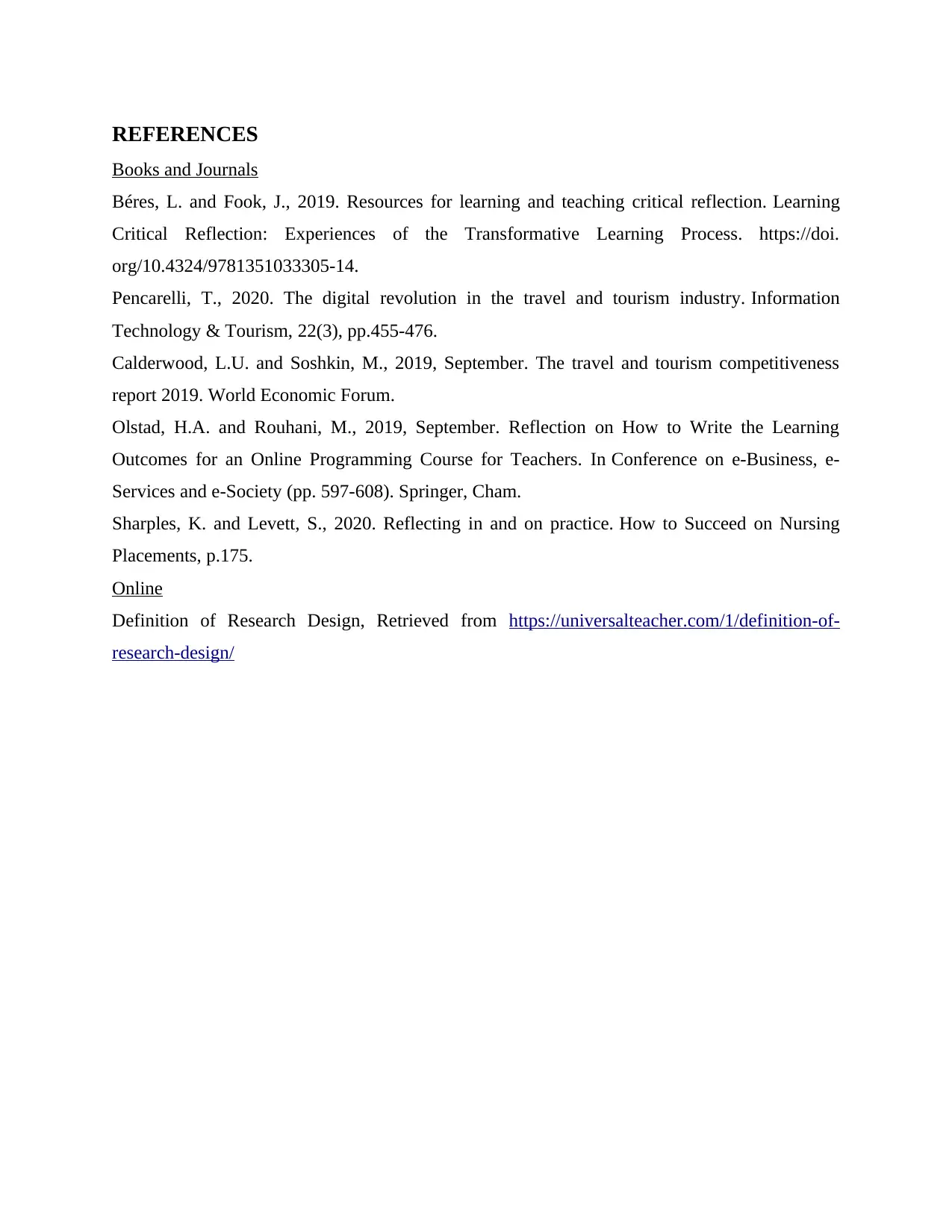
REFERENCES
Books and Journals
Béres, L. and Fook, J., 2019. Resources for learning and teaching critical reflection. Learning
Critical Reflection: Experiences of the Transformative Learning Process. https://doi.
org/10.4324/9781351033305-14.
Pencarelli, T., 2020. The digital revolution in the travel and tourism industry. Information
Technology & Tourism, 22(3), pp.455-476.
Calderwood, L.U. and Soshkin, M., 2019, September. The travel and tourism competitiveness
report 2019. World Economic Forum.
Olstad, H.A. and Rouhani, M., 2019, September. Reflection on How to Write the Learning
Outcomes for an Online Programming Course for Teachers. In Conference on e-Business, e-
Services and e-Society (pp. 597-608). Springer, Cham.
Sharples, K. and Levett, S., 2020. Reflecting in and on practice. How to Succeed on Nursing
Placements, p.175.
Online
Definition of Research Design, Retrieved from https://universalteacher.com/1/definition-of-
research-design/
Books and Journals
Béres, L. and Fook, J., 2019. Resources for learning and teaching critical reflection. Learning
Critical Reflection: Experiences of the Transformative Learning Process. https://doi.
org/10.4324/9781351033305-14.
Pencarelli, T., 2020. The digital revolution in the travel and tourism industry. Information
Technology & Tourism, 22(3), pp.455-476.
Calderwood, L.U. and Soshkin, M., 2019, September. The travel and tourism competitiveness
report 2019. World Economic Forum.
Olstad, H.A. and Rouhani, M., 2019, September. Reflection on How to Write the Learning
Outcomes for an Online Programming Course for Teachers. In Conference on e-Business, e-
Services and e-Society (pp. 597-608). Springer, Cham.
Sharples, K. and Levett, S., 2020. Reflecting in and on practice. How to Succeed on Nursing
Placements, p.175.
Online
Definition of Research Design, Retrieved from https://universalteacher.com/1/definition-of-
research-design/
⊘ This is a preview!⊘
Do you want full access?
Subscribe today to unlock all pages.

Trusted by 1+ million students worldwide
1 out of 6
Related Documents
Your All-in-One AI-Powered Toolkit for Academic Success.
+13062052269
info@desklib.com
Available 24*7 on WhatsApp / Email
![[object Object]](/_next/static/media/star-bottom.7253800d.svg)
Unlock your academic potential
Copyright © 2020–2026 A2Z Services. All Rights Reserved. Developed and managed by ZUCOL.




![Employability Skills: Reflective Review Report - [University Name]](/_next/image/?url=https%3A%2F%2Fdesklib.com%2Fmedia%2Fimages%2Fdl%2F4063ff1d0314456fbe76b73fdd2697f7.jpg&w=256&q=75)
